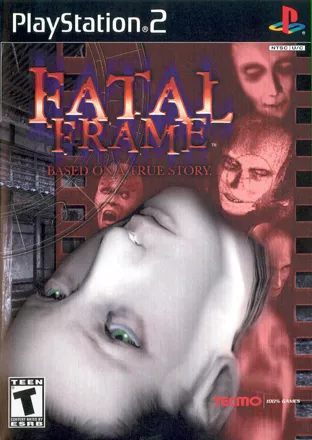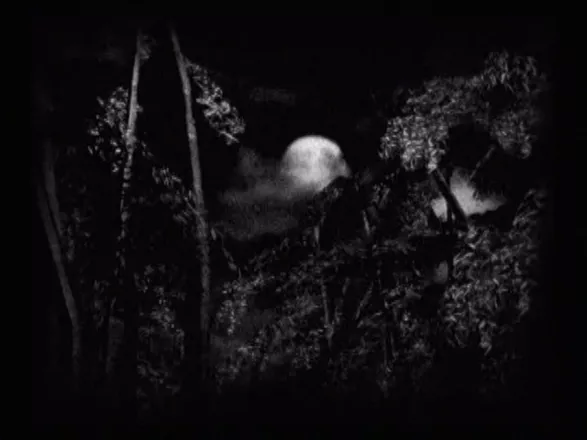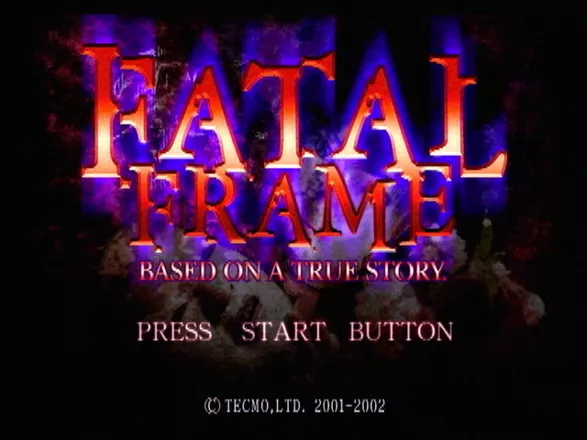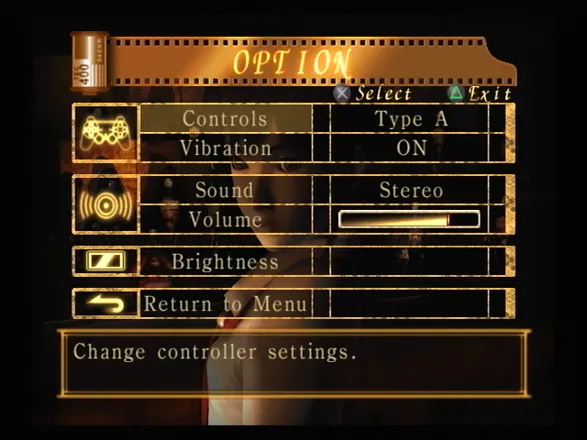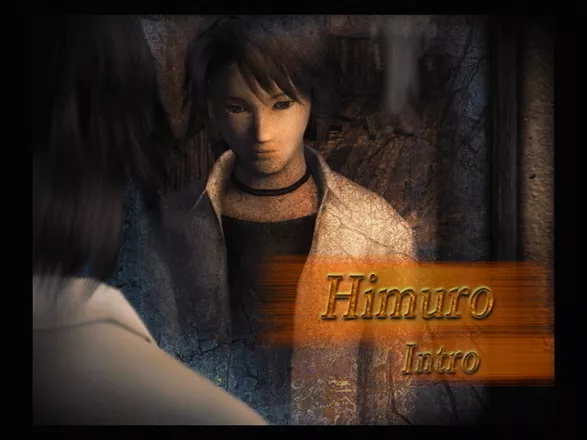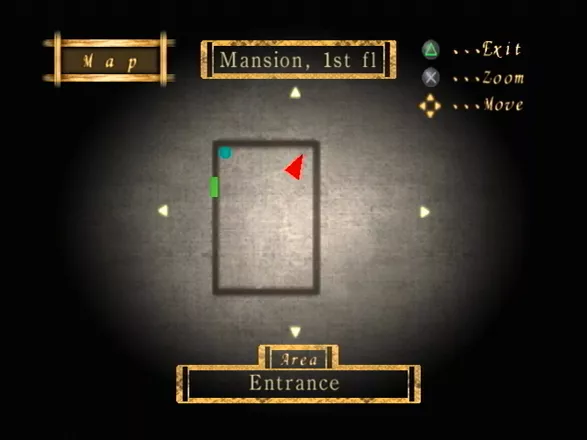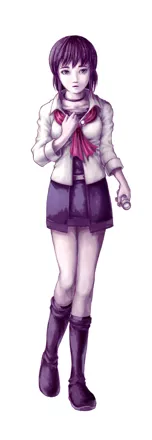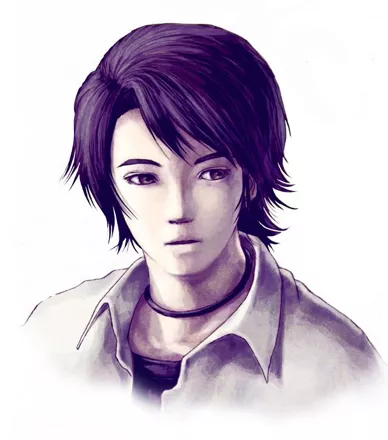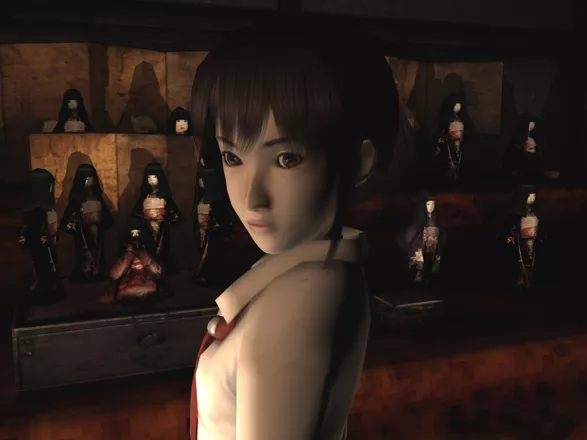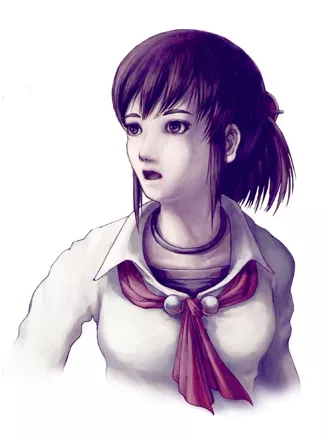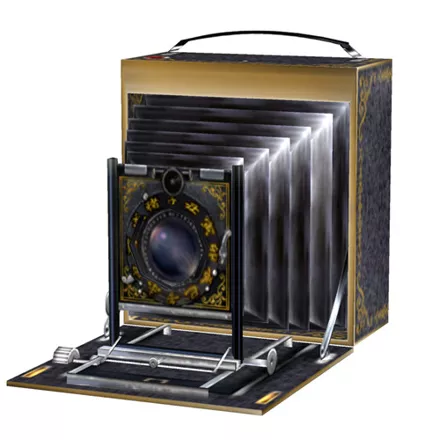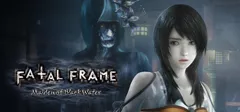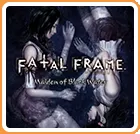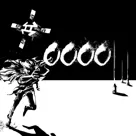Fatal Frame
-
 Fatal Frame
(2002 on
Xbox)
Fatal Frame
(2002 on
Xbox)
Description official descriptions
Miku Hinasaki is a young girl with a strange sixth sense. Her brother, Mafuyu, and his mentor, Junsei Takamine, went to investigate a mansion that once was inhabited by a powerful landowner who had absolute control over the area. Unfortunately, they never returned from their investigation. Miku enters the mansion, armed with only an antique camera given to her by her deceased mother, to try to find her brother.
While inside the mansion, Miku will encounter ghosts and other spiritual apparitions. In order to overcome these spirits and survive, she must use the magical camera to capture the ghosts on film, thereby trapping them forever. Ghosts range from invisible fragments hidden in scenery, to memories of the past that appear only for a moment before vanishing, to full body apparitions that will attempt to attack and kill Miku.
In order to defeat an aggressive ghost the Camera Obscura's shot must first be "charged" by keeping the ghost centered while it is visible. If Miku snaps a shot while the ghost is attacking or is vulnerable then she will drain even more energy from it, resulting in more spirit points being earned. Points can then be spent to improve her camera's attributes or give it special abilities, like slowing a ghost or pushing it away. The Camera Obscura can also reveal clues and dispel illusions, which Miku will need to utilize to solve puzzles within the mansion.
Spellings
- 零~zero~ - Japanese spelling
Groups +
Screenshots
Promos
Videos
Add Trailer or Gameplay Video +1 point
See any errors or missing info for this game?
You can submit a correction, contribute trivia, add to a game group, add a related site or alternate title.
Credits (PlayStation 2 version)
132 People · View all
| Producer | |
| Director | |
| Chief Programmer | |
| Character Design Director |
|
| Stage Design Director |
|
| Interface Designer | |
| Planners | |
| Programmers |
|
| Character Modeling |
|
| [ full credits ] | |
Reviews
Critics
Average score: 80% (based on 26 ratings)
Players
Average score: 3.8 out of 5 (based on 39 ratings with 4 reviews)
The Good
Not too damn much.
The Bad
I had first heard about this game a few months ago, when I was looking for a PS2 game to buy. I do enjoy the survival-horror games, although most of the time, they don't live up to the hype.
Fatal Frame is no exception. What caught my attention about this particular game was that it is "based on a true story." I have an interested in the super natural, so this grabbed my attention right away, In fact, I have gone into suspected haunted areas before, just to look around and see if I could find anything. I don't want to get off topic here, so let me get back to the matter at hand.
I bought this game (after looking for it for quite a while) expecting to be scared and impressed at the same time. Man, was I disappointed. Though, I did startled a couple of times, it was a major let down in my book.
The story takes place in 1986 in Japan at a place called: Himurto Mansion. It starts out when a photographer goes to this mansion, to look for his friend and mentor: Jensei Takaminia. Mr. Takaminia is an author, who disappeared with his team of researchers, while researching ritualistic murders for his latest book. A curse and dies affect his entire team. While looking for Mr. Takaminia, the young photographer gets trapped inside the mansion and falls victim to the hoards of ghosts that lurk inside
After two weeks, the young photographers sister sets out to the mansion to try to find out what happened to her brother. She learns about the rituals of the murders and about what happened to the ghosts left wandering around.
Your weapon in this game is a camera, which was given to your brother by your mother, before she died. This camera has the power to expose things the normal eye can't see, and can capture ghosts. Reminds me of the camera I got from my mom two Christmases ago. Again, I don't want to go off topic here; so I'll shut up about the other stuff and get on with it.
The introduction of this game is in black & white and this is the only time you can play as Mayfuyu, I know that probably isn't spelled right, but what the hell...It's not a common name.
I thought this was a really neat effect. I sat playing, waiting to get the bejesus scared out of me. I thought the background music was a nice fit for the introduction. I was however, disappointed a short time later because the music really doesn't change. After a while, I just became annoyed at the sound of it and turned my stereo down. There are ghosts that pop-up in several different areas within this game. You earn points if you can take a picture of them, before they vanish. The better shot you can get in the capture circle, the more points you get. Some of the ghosts are pretty hard to catch (like the editor in the closet.)
I found this game to be overall annoying more then anything, I didn't really find it all that difficult, aside from taking some of the pictures.
A lot of the positions of the ghosts aren't randomized at all. You can play through the same part in the game, and that ghost will always be in that spot. There are some random ghosts. Like when you get attacked going to complete a task.
Even then, it's just some girl with a broken neck or some guy that looks like a zombie. Big deal! The battle system in this game was something else I didn't like.
Typically, the way you fight in this game is to get a ghost in the lens of the camera, take a picture, then run, You have to wait for the camera to power up though, and you only have a limited number of shots. What can be particularly annoying is trying to get zero-shots. Those are the ones worth the most points. Whenever a ghost grabs you: you're forced to hear them say the same thing over and over again. (Unless you turn the sound down.) Things like: "My eyes!" "It hurts." Come back my child,” A really big pain in the ass.
The graphics looked to me, more like a cartoon like Japanese anime. I'm not big on graphics anyway. I've been playing video games for over twenty years, and I've played and seen just about everything.
I'm sure anyone can already tell: in terms of video games, it takes quite a bit to leave a good impression on me. I liked the concept and story, but the game itself is boring. I played it in the dark and it didn't keep me awake at night, Total BS.
I found the controls pretty easy to use. You have to use the analog stick and the way the camera angles are set up in this game, it took me a few minutes to get used to.
The audio in this game isn't bad, but it could have been better. There are these tapes that are around the mansion that you listen to on a tape recorder. I had to turn my stereo volume up, because it was sometimes hard to hear. The quality of the tapes got me to wondering if theses are actual recordings or just actors. I still haven't found out for sure. I don't really give a rat’s ass anymore either.
I'm not convinced that this is based on a true story; I think it may have been a marketing ploy. I looked it up and couldn't find anything.
I heard that this was the scariest game ever. In one sentence: Fatal Frame is crap.
Get it if you want, but it was a waste of my 56 bucks.
The Bottom Line
A waste of money.
PlayStation 2 · by Robert C (6) · 2003
The Good
I loved the graphics and tense atmosphere. The ghosts are what you would expected to see in real life (well to me they are). The music fits in well with the atmosphere as do the sounds. (creepy music and silence mixed - lovely). The storyline is superb and it gets the player's adrenaline pumping, especially when the vibration of the controller as a substitute for her heartbeat.
The strategic puzzles on some doors are a nice change from just having the doors open and something grabs you. Like classic "Resident Evil" style. The way you can go back and forth collecting things that weren't there before may bore some people, but I think it's part of the thrill. If you go back and find something new, you have more chance of meeting another ghost; which is an adrenaline rush.
I also like the way that it is based on a true story/folk-law (loosely) - there ARE sites out there with various information about the rituals etc. - you just have to look. Miku may only be a college girl but she knows her stuff.
The Bad
The few bad thing that I can think of is the camera angle at some points and the repetitiveness of the ghosts' whining. Constant cries of "Why"... (Even with the Editor; he cries out 'why' in a female voice) and the various tapes - the volume of them is so faint you have to turn the volume up to even hear them.
The Bottom Line
Supernatural ghostliness. Good for people who like adrenaline rushes.
PlayStation 2 · by ProjectShadow (3) · 2006
Just because you can't see it, doesn't mean it isn't there.
The Good
Something evil lurks in the Himuro Mansion. Mafuyu Hinasaki goes there in search of the missing novelist Junsei Takamine and doesn’t return. Now his sister Miku searches for him. Finding clues left by her brother and others, Miku must learn the secrets of Himuro Mansion and face the spirits who dwell there. Many have died or gone missing around the mansion and their tormented souls walk the mansion’s hallways, dripping blood on the floorboards, and staining the walls with bloody handprints. But Miku is armed with an old camera, a family heirloom, which lets her photograph things that aren’t there. The camera lets her fight the mansion’s ghosts and unlock the mansion’s mysteries by peering into its past, but can it help her save her brother and stave off a netherworld Calamity?
Fatal Frame is a third-person perspective survival horror game which is functionally like other survival horror games but with a better storyline and a better gimmick: the camera. First, the story. Without spoiling the game, Himuro Mansion was home to horrific Shinto rituals which linked together sinister elements like the Strangling Ritual and the Blinding Ritual as part of a larger religious ceremony. As Miku progresses through the game, these rituals play out and she deals not only with the terrifying events but with the ghosts of the people who went through them. Hearing tales of the Blinding Mask is nothing compared to having a ghost with bloody, empty eye sockets jump out at you yelling, “My eyes!”
The game plays out over four nights, each night having its own set of puzzles and bosses and each night drawing Miku further in. Miku gathers evidence: voices on audiocassettes, ancient scrolls, journals, research notes, and photos, and compiles the information fleshing out the mansion’s previous inhabitants and victims, learning the connection between the people doomed by the mansion, and discovering her family’s role.
In terms of scares, this game has a great many. The mansion is alive with ghosts. Some wander the hallways thinking they are still alive. Some are predatory, hunting the living. Some are captive, bound to the area where they died like the image on a photograph. Even without the visible ghosts, there’s just something wrong with the mansion. Blood drips from the ceiling, a hallway fills with dangling ropes, and lanterns start swinging where there is no wind. Is something in the shadows? Is that your reflection in the mirror? Are those Mafuyu’s footsteps or someone else’s? Luckily, Miku has the camera.
The camera is the most important inventory item in the game, especially since it’s the only weapon. Acting first like Silent Hill’s radio, the camera alerts Miku to a ghostly presence. Taking pictures switches to a first-person perspective, where Miku must make sure what she wants to photograph is in frame. Some ghosts just pop on screen for an instant, while others are waiting to be found. Taking pictures of the non-predatory ghosts scores points used to upgrade the camera. During combat with a predatory ghost, Fatal Frame uses a battle system where Miku must keep the ghosts in frame to damage them by taking their picture. The longer Miku holds them in frame, the more damage she does and if the ghost is close enough, Miku can score a critical hit.
The camera takes four types of film scattered throughout the mansion and the higher level film types do more damage to the attacking ghosts. The camera can also by upgraded by spending points on its basic attributes like range and charge speed. Miku can also unlock special powers which can knock ghosts back or paralyze them when used with the spirit stones she collects. When her health lowers, Miku can restore it with healing herbs and spirit water. If she dies while carrying a stone mirror, then her health is automatically replenished.
The camera is also important when it comes to puzzle solving. Fatal Frame has its share of slider variations and a few other obvious puzzles, but often Miku comes across an ethereal barrier. When photographed, the barriers usually show another location of the mansion indicating that Miku must do something there to continue. Fatal Frame has a great built-in map with descriptive names for rooms. For its size, Himuro Mansion could be very easy to get lost in, but every room and hallway is memorable and the interlinking doorways make sense. While you can never explore the entire mansion within one act, the game does have nonlinear sections where you can divert from the main course to explore side areas and find useful items.
Much of Fatal Frame’s scare power comes from solid graphics. Character models might show their age a little bit, but there is a consistency of design which doesn’t detract. Parts of the mansion feel slightly out of focus, much of the game is tinged with sepia, flashbacks are monochromatic and hazy, all of it gives the game both a dreamlike and nightmarish atmosphere. The mansion itself is a believable wreck, looking both real and lived in. While the gameplay stops for brief cutscenes and transitions to new Nights, moving through Himuro Mansion is seamless, with load times disguised as opening a door or descending a ladder.
Fatal Frame uses a save system similar to Resident Evil’s typewriter. Camera stands are located around the mansion and act as save points. Miku can save as often as she wishes, but too many saves lowers her ranking (which doesn’t affect the ending). Saving liberally is recommended on your first play through. Since ghosts appear out of nowhere and are able to teleport behind you, death can come quickly if you aren’t ready. Completing the game unlocks harder modes, a new outfit, and a Battle mode.
The Bad
Fatal Frame isn’t perfect. By Night Three you’ve seen the major areas of the mansion and the nature of the game means that backtracking is necessary. Also by Night Three, random combat comes too frequently and becomes too deadly to explore the mansion as thoroughly as you might like. Actually Silent Hill 3’s action/adventure settings would work really well here. Like Jade in Beyond Good & Evil, Miku would have been a fun character even if she was only focused on photographing the mansion’s ghosts.
Despite the disparate entities inhabiting Himuro Mansion, combative ghosts draw on only a few character models. Several boss battles also feature the same ghost, so I wasn’t sure if the camera was really capturing them or just driving them away. Actually the camera is one of those videogame headscratchers. Bypassing everything else, did the film fairy visit Himaru Mansion and sprinkle film everywhere. Imagine fighting Superman in his Fortress of Solitude and finding kryptonite every ten feet. But that’s just nitpicking.
Fatal Frame’s biggest failing is its voice acting and somewhat loose controls. I would love to see more games released with their original soundtracks and subtitles. Not that Siren would ever be a good game, but it would at least be tolerable in its native language. That’s something even craptacular Samurai Western got right. Anyway, Fatal Frame features American voice actors who don’t seem to have Japanese accents. Miku has a strangely breathy voice and some of the voice acting on the audiocassettes is flat.
As far as controls, Fatal Frame uses a run button instead of relying on the pressure sensitive analog sticks. Miku doesn’t move fast (run=jog) and she doesn’t corner well. When camera angles change (Fatal Frame has a solid camera system), Miku usually needs to be reoriented. Running from some ghosts is recommended, but can be overly difficult and downright unfair if the nab her during a new room transition.
The Bottom Line
Fatal Frame isn’t the scariest game I’ve played, but it does have one of the better stories. Fatal Frame is right in there with the new wave of J-horror. Like Ringu or Ju-on, Fatal Frame features terrifying moments, bringing back vengeful ghosts who can hurt you. Fatal Frame is also a welcome change in terms of the survival horror trend of throwing otherworldly enemies at you who can be downed with a few bullets or hunting down zombies with rocket launchers.
Finally, Fatal Frame should be applauded for not featuring a girl in danger. Miku has willingly put herself in a dangerous place in search of her brother. While the gameplay might have more of what is thought of as a male appeal, Miku’s story and the story of the mansion should have a strong appeal for female gamers as well. And it accomplishes a lot with only a T rating.
PlayStation 2 · by Terrence Bosky (5397) · 2005
Trivia
Inspiration
The tagline of the North American release of Fatal Frame is "Based on a True Story." In an interview, the producer of Zero, Makoto Shibata, explains the story that inspired the game:
In an area outside Tokyo, there lies a mansion in which it’s said seven people were murdered in a grisly manner. On the same property, there lie three detached residences that surround the mansion, all of which are rumored to have ties to the mansion’s troubled past. It’s said there is an underground network of tunnels that lay beneath the premises, but nobody knows who made these tunnels or what purpose they served.
Many inexplicable phenomenon have been reported occurring on the property. Bloody hand prints have been found splattered all over the walls. Spirits have been spotted on the premises… even in broad daylight. A narrow stairway leads to an attic where a spirit-sealed talisman is rumored to be locked away. Men have sought this talisman, only to be found later with their bodies broken and rope marks around their wrists. There’s a crumbling old statue of a woman in a kimono, but its head is missing. If you take a photo of a certain window, a young girl can be seen in the developed picture.
These incidents have provoked fear in the people of Tokyo, and many believe that those who live near this area will become cursed. The deaths of those seven people are unexplained to this day."
Considering how this tagline does not appear on any other region's release, and how the only mention of the story appears online after Fatal Frame's release, this story was likely fabricated by TECMO's marketing division.
Lawsuit
The developer of Fatal Frame, Tecmo, was quickly sued by the movie company behind Ghostbusters, claiming that the idea of capturing ghosts in a camera infringed upon the concept of Ghostbusters. The case was later dropped.
Novel
There's a novelization of the game. It's told from the viewpoint of Mafuyu Hinasaki and it's storyline is a little bit different. Unfortunately, its only in Japanese. It is called Zero: The Novel, ISBN 4840220654, available on The Japanese Amazon website.
Version differences
The European and American versions of the game differ from the Japanese version. The main character, Miku's appearance and outfit have been changed to represent more Western people rather than Japanese.
Information also contributed by Daedolon, Donatello, j.jones and Lain Crowley
Analytics
Upgrade to MobyPro to view research rankings and price history! (when applicable)
Related Sites +
-
Beyond The Camera's Lens
This is a Fatal Frame fansite devoted to uncovering the facts and fiction within/around Tecmo's Fatal Frame Game series. -
Fatal Frame
The official English homepage of the game. -
Wikipedia: Fatal Frame
Information about Fatal Frame at Wikipedia
Identifiers +
Contribute
Are you familiar with this game? Help document and preserve this entry in video game history! If your contribution is approved, you will earn points and be credited as a contributor.
Contributors to this Entry
Game added by JPaterson.
PlayStation 3 added by Fred VT.
Additional contributors: Terrence Bosky, Unicorn Lynx, Exodia85, Dae, DreinIX, Patrick Bregger.
Game added March 13, 2002. Last modified May 27, 2024.


